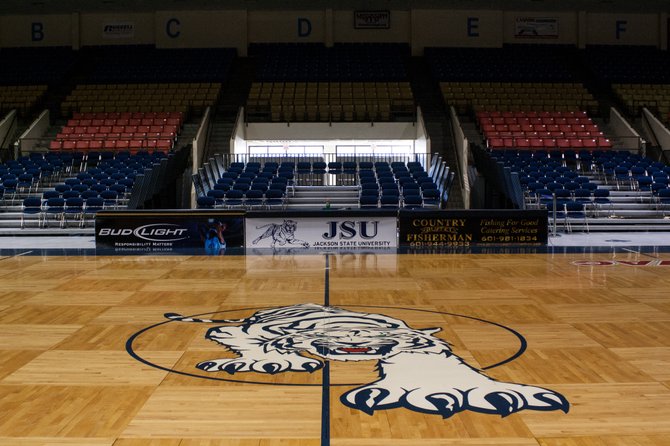The NCAA is giving Jackson State University $900,000 to improve the academic performance of student-athletes. Only 20 percent of JSU athletes complete a degree in four years. Photo by Jacob Fuller.
Jackson State University and the NCAA are trying to help student-athletes earn their degrees, even if that means sticking around a little longer than four years.
Nationwide, only 55 percent of four-year college entrants earned a degree in that time period, a study by the University of Tennessee's Center for Business and Economic Research and the Tennessee Higher Education Commission revealed. At JSU, only 20 percent complete their degree in four years; 40 percent complete it within six years.
At Jackson State, 95 percent of students receive some form of financial aid to fund their educations. Many students, including student-athletes, rely on scholarships. When those sports scholarships dry up, many are left without a degree and without the means to pay for further school hours.
The NCAA, with the help of JSU and five other pilot participants, is putting big money into the 930 Initiative, which will focus on trying to find out what universities can do to help those student-athletes earn their degrees in four years, or stay and complete their degree requirements after they exhaust their athletic eligibility.
"Everyone here is committed to academic success," Athletics Director Vivian Fuller said at a press conference Dec. 11. "Jackson State will enhance and embrace this 930 Initiative."
JSU will receive $900,000 over the next three years to implement the initiative, which will provide financial aid for summer school hours for student-athletes, aid for former student-athletes who no longer have athletic eligibility, online tutoring services, more academic counselors and a hi-tech classroom.
The money will come from a $10-million fund that a U.S. District judge ordered the NCAA to create in 2008 to help former student-athletes earn career development skills. The ruling came from a class-action lawsuit in which the plaintiffs claimed NCAA rules limiting grants-in-aid to tuition, room and board in certain sports was a restriction of trade.
A committee of NCAA representatives chose JSU as one of six universities nationwide to receive grants from the Limited-Resource Institutions Grant Program Pilot. The pilot will provide between $330,000 and $900,000 to the six institutions over the next three years.
"Jackson State University is thrilled to be selected by the NCAA for this innovative program," JSU President Carolyn W. Meyers said at the press conference.
Representatives chose participating universities from Division 1, non-Football Bowl Subdivision teams in the bottom 10 percent of per-capita institutional expenditures, athletics department funding and Pell Grant aid. They based their six selections on several criteria, including presidential oversight, goals identified by the university, the institution's ability to match grant funds, the institution's NCAA infraction history and a demonstrated sustainability of the initiative by the university.
The university is required to match 25 percent of the NCAA funds the first year, 50 percent the second and 75 percent the third year. For those matches, JSU is getting help from the SWAC, which will provide $400,612 in matching funds. JSU will provide $50,000 to the program.
Meyers hopes the additional funding will further the recent positive trend in athletes' performance in the classroom. Those improvements, Meyers said, are due in large part to new initiatives for student-athletes that include a stricter class attendance policy, extended study-hall hours and immediate penalties for students who do not attend, and new tutoring resources.
"This grant will allow us to build on these (programs) and to institutionalize these support measures," Meyers said.
Under NCAA rules, athletic teams must have a minimum average APR of 930 over the two most-recently completed years, or 900 over the last four years to compete in tournaments, championships or bowl games. That is why JSU is calling its program the 930 Initiative. All of JSU's teams meet this year's minimum requirements.
What is APR?
Academic Progress Rate is the formula NCAA uses to determine if teams are eligible for postseason tournaments and championships. The NCAA awards each athlete one point for staying in school and one point for remaining academically eligible. All team members' points are then added together, divided by the total possible points and multiplied by 1,000 to get the APR. A perfect APR is 1,000.



Comments
Use the comment form below to begin a discussion about this content.
comments powered by Disqus